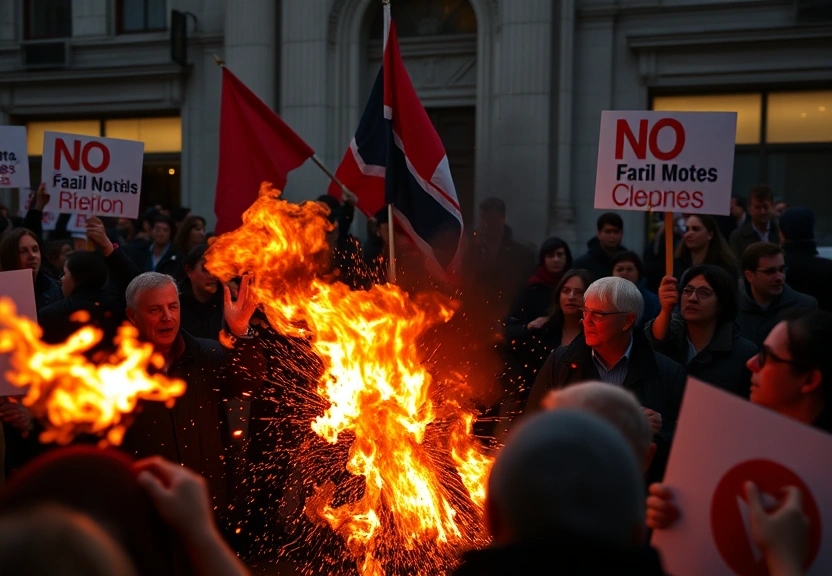Chaos Erupts as No 10 Struggles to Prevent Labour Welfare Rebellion
In the heart of British politics, a storm is brewing as Downing Street grapples with the fallout from a significant Labour welfare rebellion. As MPs, including select committee chairs, express skepticism regarding the concessions made last week, the government finds itself in a precarious position. With a crucial vote looming, tensions are high as the brinkmanship between the government and rebellious MPs escalates, highlighting the deep divisions within government departments on how to address the growing discontent.

The situation has become increasingly chaotic as the government’s strategy to quell dissent appears ineffective. The concessions offered seem insufficient to appease the discontent among MPs, igniting fears of a more significant backlash. As the knife-edge vote approaches, it’s clear that Downing Street must act swiftly to regain control of the narrative and prevent a wider political fallout.
The Background of the Labour Welfare Rebellion
The recent Labour welfare rebellion stems from a broader dissatisfaction with government policies that many MPs believe are inadequate in addressing the needs of vulnerable populations. This rebellion is not an isolated incident; rather, it’s a culmination of growing frustrations regarding welfare reforms that critics argue could push hundreds of thousands into poverty.
Understanding the Concessions
Last week, Downing Street attempted to placate dissenting voices by agreeing to a series of concessions. However, the effectiveness of these concessions is now in question. Many MPs assert that the changes do not go far enough to address the pressing concerns of their constituents. The concessions included modifications to welfare policies and promises of increased funding for specific programs, yet the reception from within the party has been tepid at best.
The Role of Select Committee Chairs
Select committee chairs play a crucial role in shaping parliamentary discourse and influencing governmental action. Their expressed doubts about the concessions signal a significant challenge for the government. These influential MPs have a platform to voice concerns and rally support, making their skepticism particularly damaging for Downing Street’s efforts to maintain party unity.
Internal Divisions Within Government Departments
One of the most alarming aspects of the current crisis is the evident division among government departments regarding how to handle the situation. Some departments advocate for a more conciliatory approach, while others push for a stricter stance against the rebels. This lack of coherence not only undermines the government’s authority but also exacerbates the feeling of chaos as MPs seek clarity and a decisive response to their demands.
Political Brinkmanship at Play
The ongoing tensions reflect a broader trend of political brinkmanship that has characterized UK politics in recent years. As MPs weigh the potential consequences of their actions, both sides are engaged in a high-stakes game where the risks are palpable. The government must balance appeasing dissenters while maintaining its core policies, a tightrope that is proving increasingly difficult to navigate.
The Implications of the Rebellion
The implications of the Labour welfare rebellion extend beyond immediate parliamentary votes. If the government fails to effectively manage this crisis, it risks losing not only the support of its MPs but also public confidence. A significant backlash could result in a reshaping of political alliances and a shift in public sentiment ahead of future elections.
Potential Outcomes
- Increased Political Pressure: The government may face mounting pressure to revise welfare policies more substantially.
- Resignations and Leadership Challenges: If the situation escalates, it could lead to calls for resignations or challenges to leadership within the party.
- Public Backlash: Continued dissatisfaction among constituents could result in a significant electoral backlash against the governing party.
Frequently Asked Questions (FAQs)
1. What triggered the Labour welfare rebellion?
The rebellion was triggered by widespread dissatisfaction among MPs regarding welfare reforms deemed inadequate to meet the needs of vulnerable populations.
2. What concessions did Downing Street offer?
Downing Street offered concessions that included modifications to welfare policies and promises of increased funding for specific programs, though many MPs feel these changes are insufficient.
3. How are select committee chairs influencing the situation?
Select committee chairs are influential MPs who can voice concerns and rally support against government policies, making their skepticism particularly damaging for the government’s efforts to maintain party unity.
4. What are the divisions within government departments?
There are significant divisions regarding how to respond to the rebellion, with some departments favoring a conciliatory approach while others advocate for a stricter stance.
5. What are the potential consequences of the rebellion?
The consequences could include increased political pressure on the government, possible resignations or leadership challenges, and a backlash from the public in future elections.
Conclusion
The chaos that has erupted within Downing Street over the Labour welfare rebellion underscores the fragility of political unity in the face of dissent. As MPs express doubts about the adequacy of concessions made by the government, the divisions within government departments reveal a lack of coherent strategy. With a knife-edge vote on the horizon, the stakes are high, and the government faces a critical juncture. How it navigates this turmoil will not only shape its immediate future but also define its long-term standing with both MPs and the public. In this environment of political brinkmanship, the ability to foster unity and address the concerns of dissenting voices will be paramount to restoring order and confidence in governance.
📰 Original Source
Este artigo foi baseado em informações de: https://www.theguardian.com/politics/2025/jun/30/welfare-reforms-could-push-150000-into-poverty-despite-concessions-impact-report-shows


